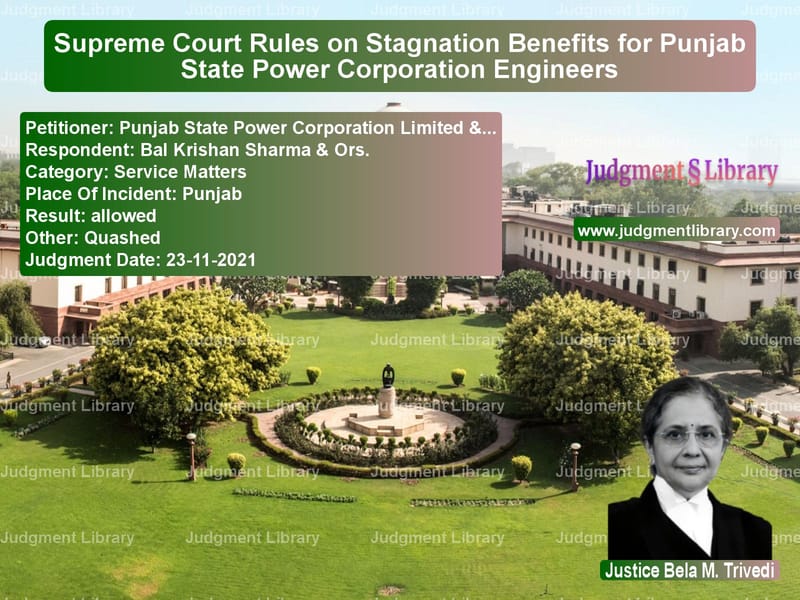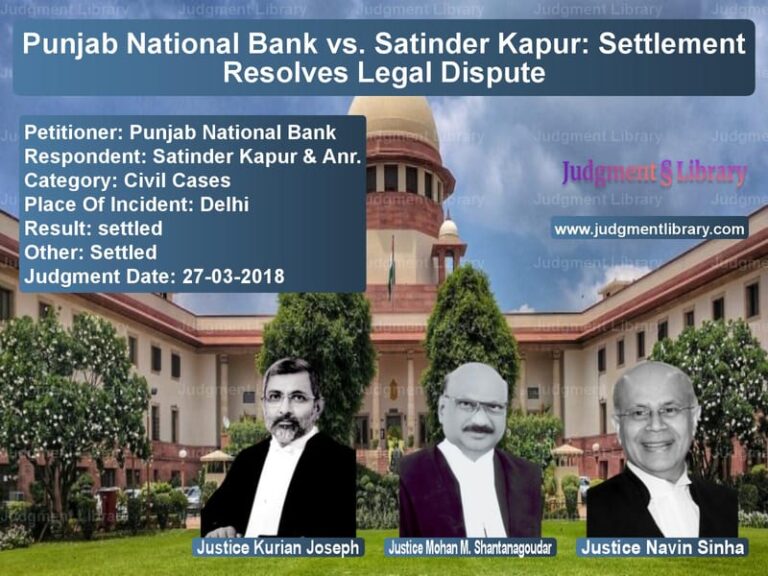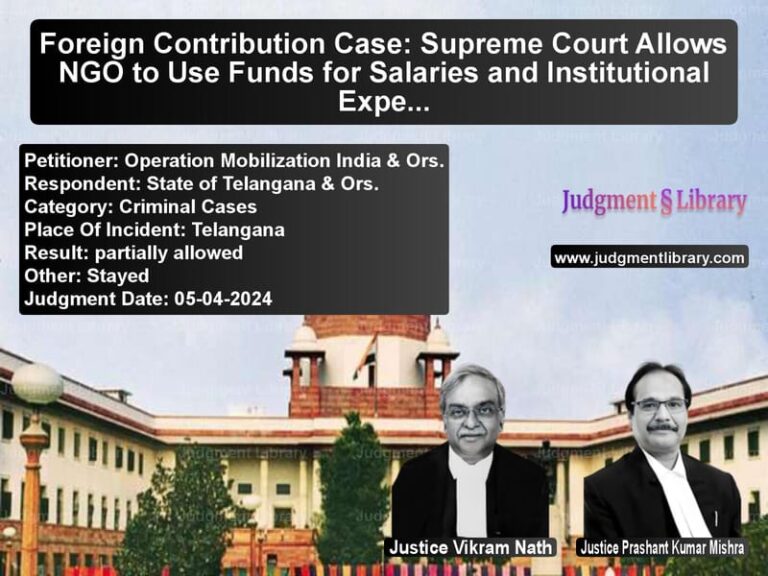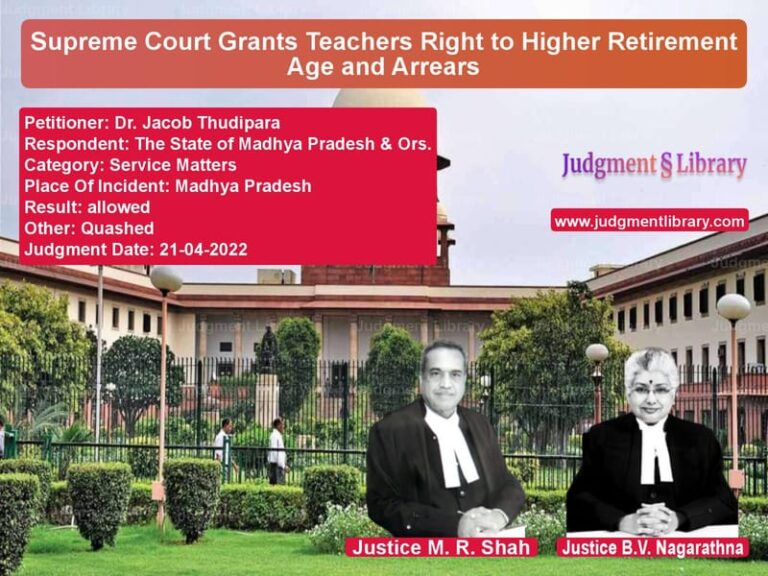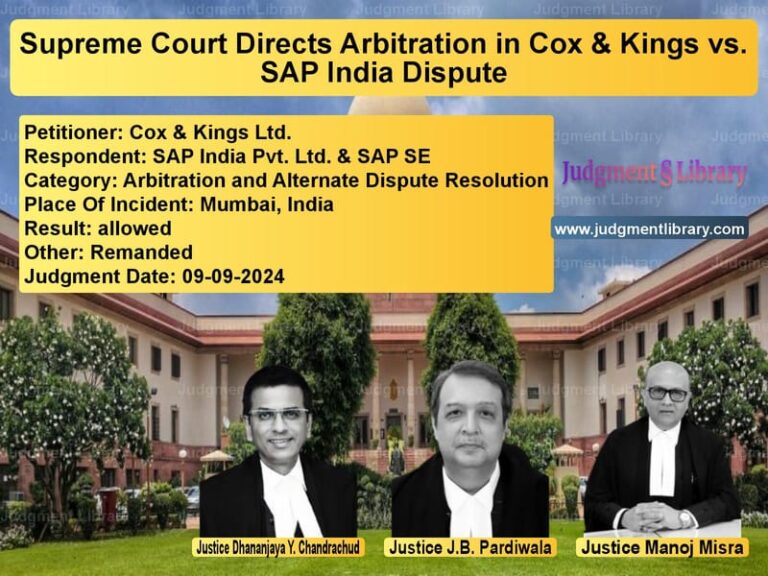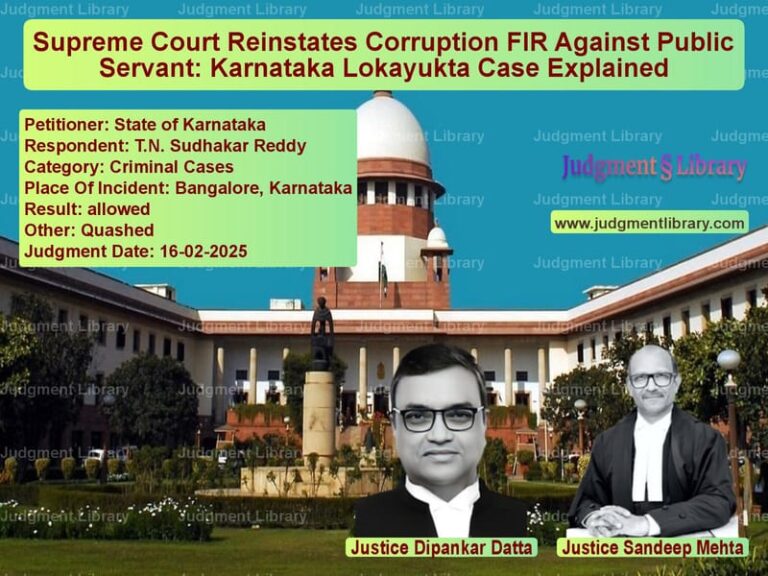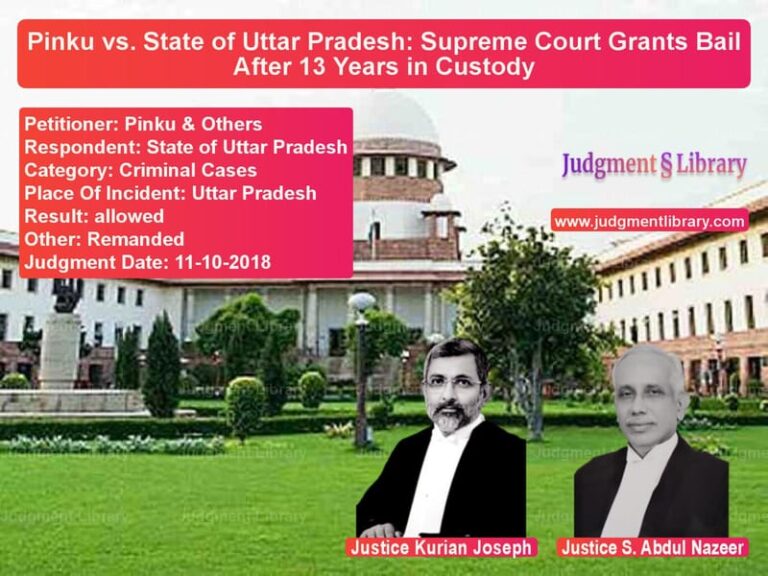Supreme Court Rules on Stagnation Benefits for Punjab State Power Corporation Engineers
The Supreme Court of India has ruled on a long-standing dispute regarding the entitlement of Junior Engineers (Civil) in the Punjab State Power Corporation Limited (formerly Punjab State Electricity Board) to higher pay scales under a time-bound promotional scheme. The case, Punjab State Power Corporation Limited & Anr. vs. Bal Krishan Sharma & Ors., was brought before the Court after conflicting judgments by the Punjab and Haryana High Court regarding the interpretation of service benefits and pay scale entitlements.
Background of the Case
The case dates back to 1989, when the Punjab State Electricity Board (PSEB) introduced a scheme to provide time-bound benefits to address stagnation among regular employees. This scheme allowed employees to receive higher pay scales after completing 9 and 16 years of service. Following this, in 1990, 20% of the Junior Engineer-II (Civil) cadre posts were upgraded to Junior Engineer-I (Civil), with increased pay scales. However, a dispute arose regarding whether the remaining Junior Engineers (Civil) were entitled to the upgraded scales after completing the required service period.
A group of Junior Engineers (Civil) filed a writ petition seeking the higher pay scales applicable to Assistant Engineers and Executive Engineers upon completion of 9 and 16 years of service, respectively. They argued that the scheme should grant them these promotional scales even if they were not formally promoted. The Single Judge of the Punjab and Haryana High Court ruled in favor of the engineers, and the Division Bench upheld this decision.
Key Issues Before the Supreme Court
- Whether the time-bound promotion scheme entitled Junior Engineers (Civil) to pay scales equivalent to Assistant Engineers and Executive Engineers.
- Whether the 1990 office order upgrading 20% of the posts required notification in the Official Gazette under Section 79 of the Electricity (Supply) Act, 1948.
- Whether the revised pay scales issued by the PSEB were legally binding on the engineers.
Petitioner’s Arguments (Punjab State Power Corporation Limited)
The power corporation contended that:
- The time-bound promotion scheme was introduced solely to alleviate stagnation and did not confer an automatic right to the pay scales of higher posts.
- The upgradation of 20% of Junior Engineer-II (Civil) posts to Junior Engineer-I (Civil) did not amount to a formal promotion or entitlement to Assistant Engineer scales.
- The High Court’s ruling was erroneous in interpreting the scheme as granting financial benefits equivalent to actual promotions.
- The decision did not require a Gazette notification as it was an administrative measure, not a statutory amendment.
Respondent’s Arguments (Junior Engineers)
The engineers argued that:
- The original 1989 and 1990 office orders clearly stated that engineers who completed 9 and 16 years of service were entitled to higher pay scales.
- The power corporation’s decision to create an intermediary Junior Engineer-I (Civil) post was an attempt to deny them the promotional benefits to which they were entitled.
- The absence of a Gazette notification made the 1990 upgradation invalid, and they should be granted direct access to Assistant Engineer and Executive Engineer scales.
- The time-bound benefit was a substitute for promotion and should provide financial parity with those who were promoted.
Supreme Court’s Observations
1. Nature of Time-Bound Promotional Benefits
The Court ruled that the scheme was designed to provide financial relief to employees who were unable to get promoted due to limited vacancies. It stated:
“Time-bound promotional benefits are intended to address stagnation but do not replace the requirements of qualification, selection, and promotion procedures.”
2. Legality of Pay Scale Upgradation
The Supreme Court ruled that the corporation was within its rights to upgrade 20% of the posts and that such an upgradation did not amount to automatic promotion for all engineers:
“The creation of Junior Engineer-I (Civil) posts was a legitimate administrative decision that did not require a Gazette notification under Section 79 of the Electricity (Supply) Act, 1948.”
3. Misinterpretation of the Scheme by the High Court
The Court found that the High Court had incorrectly interpreted the scheme as an automatic right to the pay scales of Assistant Engineers and Executive Engineers:
“Merely completing a certain number of years in service does not entitle an employee to the pay scale of a higher post unless he or she is formally promoted.”
4. Validity of Administrative Orders
The Court held that the 1990 upgradation order was valid and binding, noting:
“The board has the authority to revise pay scales and create new cadre posts without requiring statutory amendments.”
Final Judgment
The Supreme Court ruled:
- The engineers are not entitled to the pay scales of Assistant Engineers or Executive Engineers based solely on length of service.
- The time-bound promotional scheme was legally valid and did not require a Gazette notification.
- The decision to upgrade 20% of posts was a valid administrative action.
- The High Court’s ruling was incorrect and was set aside.
Impact of the Judgment
The ruling clarifies key principles regarding service conditions in public sector enterprises:
- Time-bound benefits are distinct from actual promotions and do not automatically confer higher pay scales.
- Public sector organizations can modify pay structures through administrative orders.
- Upgradation of posts does not require a Gazette notification unless it changes fundamental service conditions.
- Employees must meet qualification and selection criteria for formal promotions.
Conclusion
The Supreme Court’s verdict provides clarity on the implementation of time-bound promotional schemes in government organizations. It ensures that while employees are protected from stagnation, financial benefits must align with actual promotional hierarchies. This ruling upholds the principles of service jurisprudence and prevents arbitrary financial upgradation without due process.
Petitioner Name: Punjab State Power Corporation Limited & Anr..Respondent Name: Bal Krishan Sharma & Ors..Judgment By: Justice Bela M. Trivedi.Place Of Incident: Punjab.Judgment Date: 23-11-2021.
Don’t miss out on the full details! Download the complete judgment in PDF format below and gain valuable insights instantly!
Download Judgment: punjab-state-power-c-vs-bal-krishan-sharma-&-supreme-court-of-india-judgment-dated-23-11-2021.pdf
Directly Download Judgment: Directly download this Judgment
See all petitions in Promotion Cases
See all petitions in Public Sector Employees
See all petitions in Employment Disputes
See all petitions in Judgment by Bela M. Trivedi
See all petitions in allowed
See all petitions in Quashed
See all petitions in supreme court of India judgments November 2021
See all petitions in 2021 judgments
See all posts in Service Matters Category
See all allowed petitions in Service Matters Category
See all Dismissed petitions in Service Matters Category
See all partially allowed petitions in Service Matters Category

